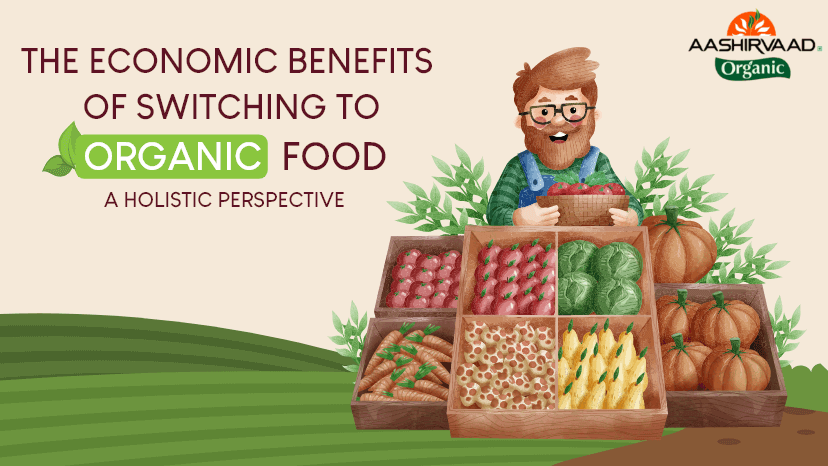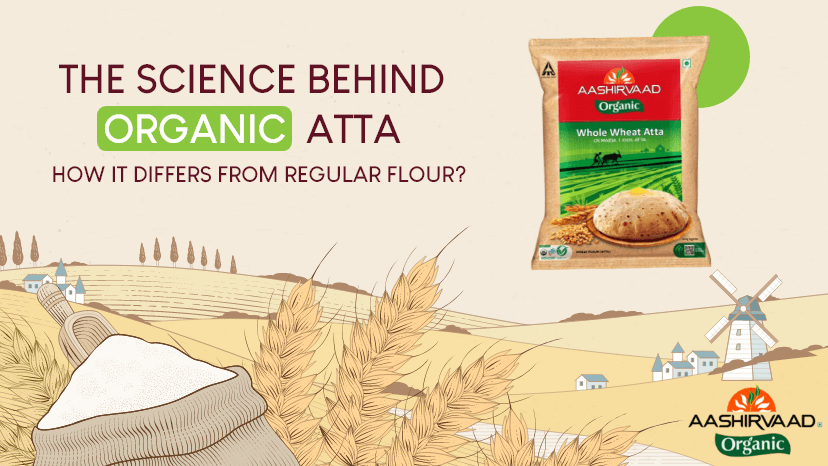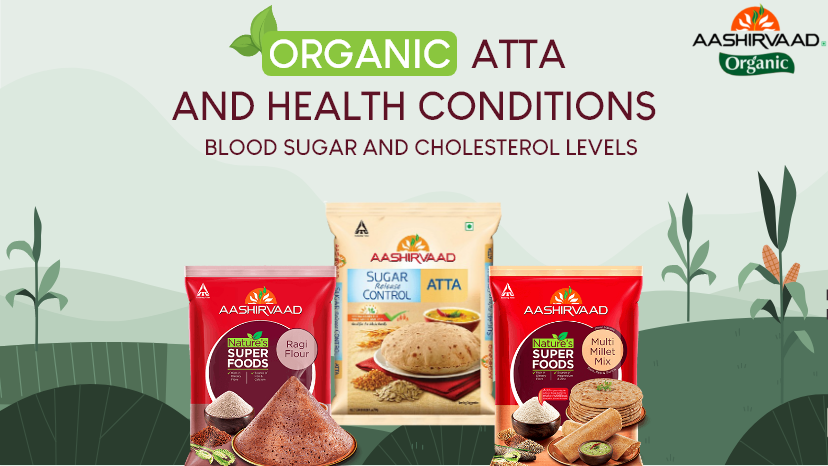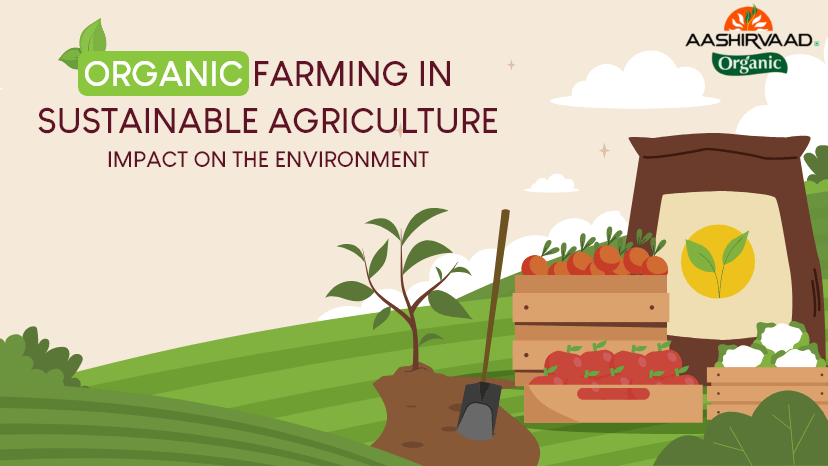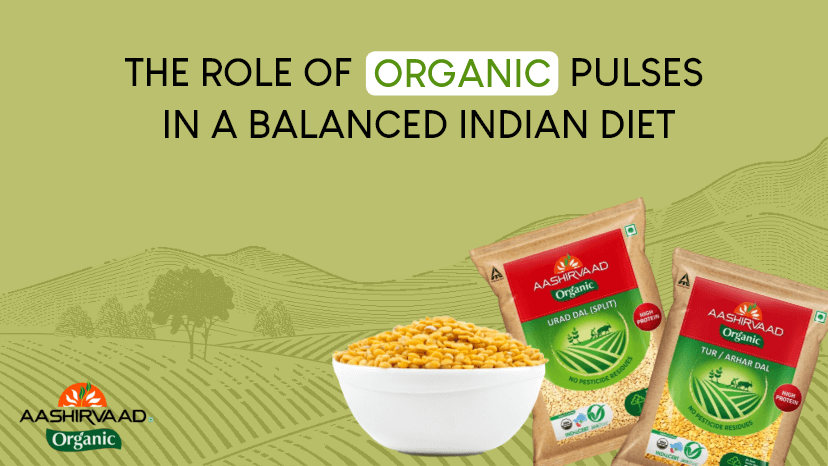Every meal we consume has a backstory. Have you ever given any attention to how your food comes to you in our fast-paced, automated society? Before it reaches our tables, it passes through farms, fields, and processing facilities. The food we eat is cultivated using different methods. It might be organically grown or using conventional methods.
Some might think the idea of pure and organic food is old-fashioned. But here’s a surprise – it’s not just something from the past; it’s happening right now.
Choosing organic food does not imply living in the past. It entails entering a time when food is efficient and pure. Startled? It’s not required to be. This shift has many advantages beyond one’s wellness concerns. It’s an economic change, a domino effect that affects not just our health but also the wealth of our local communities and the sustainability of our world.
Making the switch to organic food might improve your finances in addition to your health. Here’s a holistic perspective on the economic advantages of transitioning to organic agriculture and consumption.
1. How Do Consumers Benefit Economically By Switching To Organic Foods?
a. Access to Chemical-Free Products Reduce Health Risks
Organic farming avoids artificial fertilizers and pesticides, lowering the possibility of chemical residues in food. You can enjoy products free of potentially dangerous chemicals, encouraging a healthy lifestyle and possibly preventing health problems linked to chemical exposure.
To get the best nutrition and taste, you might look for superfoods as they have been part of Indian food culture. The Aashirvaad Nature’s Superfoods have good nutritional value and is made from ancient grains such as jowar and ragi. This way, you can experience taste and health and help retain sustainability by choosing organic!
b. Supporting Local Economies leads to Community Resilience
Smaller and more frequently local organic farms predominate. Buying organic products boosts the local economy and builds community resilience, and this way, you can help local farmers. This support encourages sustainable farming methods and preserves agricultural diversity.
Local sourcing means shorter supply chains, leading to reduced transportation costs. By choosing organic products from nearby farms, you indirectly benefit from the lower overall production cost. Therefore, transferring savings to you through competitive pricing makes local organic options economically appealing.
c. Reduced Environmental Impact leads to Long-Term Sustainability
When you purchase organic items, it indirectly supports ecologically friendly farming methods. This way, you contribute to the ecology and help lessen the environmental impact of agriculture, and ecosystems can remain sustainable over time. Healthy ecosystems and a planet benefit you, and the cycle continues.
In the long run, this results in financial savings and environmental benefits. A healthy environment bolsters sustainable agricultural methods, guaranteeing a steady and dependable supply of organic foods.
d. Preservation of Agricultural Diversity leads to Market Diversity
Encouraging nearby organic farmers contributes to the market’s continued diversity of crops. This diversity is essential for economic resilience, reducing the risk of relying heavily on a single crop or product. A robust and diverse market that is more resilient to outside shocks benefits you and keeps you away from price fluctuations.
e. Cultivation of Unique Local Products leads to Market Differentiation
Local farms often produce unique, region-specific products. Selecting these goods enhances your experience by adding authenticity to your food choices. And who doesn’t like uniqueness in dietary habits?
Additionally, it gives nearby farmers a specific market niche to prosper financially by producing goods that stand out in the marketplace. This ultimately provides food items to you at a reasonable cost.
f. Direct Support for Local Businesses leads to Entrepreneurial Growth
Many organic farms in the area are tiny enterprises. By purchasing organic foods, you help these small farmers develop directly by selecting their products. This kind of assistance encourages neighborhood entrepreneurship, which feeds into the economy to benefit farmers. This benefit will automatically get transferred to you.
g. Positive Impact on Property Values leads to Community Investment
A flourishing local economy can significantly impact property values that prosperous organic farmers in the area bolster. Due to economic development, property values may increase, making the neighborhood more desirable and offering homeowners a real financial advantage.
If you want to enrich your experience with organic food, look nowhere else than Aashirvaad Organic. It is all about simple, tasty food for you and the planet. We carefully grow our ingredients without any harmful stuff. That means healthier meals for you and a happier Earth. Enjoy the goodness of nature with Aashirvaad Organic!
| Point | Summary |
| 1. Access to Chemical-Free Products | Organic farming avoids artificial fertilizers and pesticides, reducing chemical residues in food. Promotes a healthy lifestyle and may prevent health problems from chemical exposure. |
| 2. Supporting Local Economies | Buying organic products from local farms boosts the economy, builds community resilience, and supports sustainable farming methods. Shorter supply chains lead to reduced transportation costs. |
| 3. Reduced Environmental Impact | Purchasing organic items indirectly supports ecologically friendly farming, contributing to long-term environmental sustainability. |
| 4. Preservation of Agricultural Diversity | Encouraging local organic farmers helps maintain crop diversity, reducing the risk of relying heavily on a single crop and promoting economic benefits. |
| 5. Cultivation of Unique Local Products | Local farms produce unique, region-specific products, enhancing food choices with authenticity and providing a market niche for nearby farmers. |
| 6. Direct Support for Local Businesses | Purchasing organic foods from small local farms supports entrepreneurial growth, benefiting the local economy and farmers. |
| 7. Positive Impact on Property Values | A flourishing local economy, supported by prosperous organic farmers, can increase property values, making the neighborhood more desirable. |
2. How Do Farmers Benefit Economically By Switching To Organic Farming?
a. Premium Prices for Organic Products due to Market Demand
If you are among the ones who place a higher priority on environmental sustainability and health, you are becoming more and more demanding organic products. Therefore, a switch is seen in organic farming instead of conventional farming. Farmers who convert to organic farming methods frequently get paid more for their organic produce, which is a direct financial gain.
b. Access to Niche Markets due to Market Diversification
Organic farmers can access niche markets catering to organic and environmentally conscious consumers. This diversification allows farmers to tap into specialized markets, potentially increasing sales and revenue.
c. Government Incentives and Subsidies to Support Programs
The government offers incentives, subsidies, and support programs to encourage farmers to adopt organic practices. This financial assistance can offset the initial costs of transitioning to organic farming, making it economically viable for farmers.
d. Improved Soil Health and Reduced Long-Term Costs by Sustainable Practices
Organic farming emphasizes soil health through crop rotation and cover cropping. Over time, this can improve soil fertility and structure, reducing the need for costly inputs and enhancing the land’s long-term productivity.
e. Reduced Dependency on External Inputs leading to Self-Sufficiency
Self-sufficiency-promoting techniques, such as making compost on the farm and employing organic pest management, are encouraged by organic farming. As a result, there is less reliance on outside resources, giving producers more control over costs [5].
f. Better Ecosystem Services and Biodiversity as a Result of Natural Pest Control
Naturally occurring pest management services, such as preserving the farm’s biodiversity, can be obtained from organic farming methods. Farmers will save money since they will require fewer costly chemical pesticides.
g. Long-Term Sustainability and Resilience due to Adaptation to Climate Change
Organic farming practices, including diversified cropping systems, can enhance the resilience of farms to climate change. This adaptability can safeguard farmers against the risks associated with extreme weather events, contributing to long-term economic sustainability.
h. Certification and Market Recognition leading to Credibility and Trust
Organic certification adds credibility to a farmer’s products and assures consumers of adherence to organic standards. This can increase market recognition and consumer trust, positively influencing sales and economic returns.
Our mission at Aashirvaad Organic is to build trust through openness. Selecting Sach Much Organic items from Aashirvaad, backed by an extensive testing protocol like the 217 Tests for Pesticide-Free Produce, considerably lowers chemical exposure. Curious to experience this journey yourself? Just visit the Aashirvaad’s Sach Much Organic link and learn more about your Sach Much Organic Products.
| Point | Summary |
| 1. Access to Chemical-Free Products | Organic farming avoids artificial fertilizers and pesticides, reducing chemical residues in food. Promotes a healthy lifestyle and may prevent health problems from chemical exposure. |
| 2. Supporting Local Economies | Buying organic products from local farms boosts the economy, builds community resilience, and supports sustainable farming methods. Shorter supply chains lead to reduced transportation costs. |
| 3. Reduced Environmental Impact | Purchasing organic items indirectly supports ecologically friendly farming, contributing to long-term environmental sustainability. |
| 4. Preservation of Agricultural Diversity | Encouraging local organic farmers helps maintain crop diversity, reducing the risk of relying heavily on a single crop and promoting economic benefits. |
| 5. Cultivation of Unique Local Products | Local farms produce unique, region-specific products, enhancing food choices with authenticity and providing a market niche for nearby farmers. |
| 6. Direct Support for Local Businesses | Purchasing organic foods from small local farms supports entrepreneurial growth, benefiting the local economy and farmers. |
| 7. Positive Impact on Property Values | A flourishing local economy, supported by prosperous organic farmers, can increase property values, making the neighborhood more desirable. |
3. Chew on these Insights
Organic farming is a sustainable approach that positively impacts the environment and health of human beings and wildlife because no agrochemicals such as pesticides, insecticides, herbicides, and synthetic fertilizers are used compared to conventional farming. To make it a point to highlight Organic farming methods accord with the four ethical principles :
a. Principle of health.
“Organic agriculture should sustain and enhance the health of soil, plant, animal, humans, and planet as one and indivisible.”
b. Principle of ecology.
“Organic agriculture should be based on living ecological systems and cycles, work with them, emulate them, and help sustain them.”
c. Principle of fairness.
“Organic agriculture should build on relationships that ensure fairness concerning the common environment and life opportunities.”
d. Principle of care.
“Organic agriculture should be managed in a precautionary and responsible manner to protect the health and well-being of current and future generations and the environment.”
Organic farming needs to be implemented worldwide, and organic food consumption needs to be promoted for it to be profitable and sustainable.
Considering the above principles, Aashirvaad has developed different organic food products. We have Organic Whole Wheat Atta and organic pulses like Organic Urad Whole, Organic Rajma, Organic Moong Dal and many such in our store. Our range of organic products has been expertly sourced and hygienically packed so that you get great taste and nutrition. Going Organic is one step forward towards a sustainable way of life.
4. Pathways leading to Economic Benefits of Organic Foods
The increasing adverse effects of traditional agriculture on the environment, the economy, and society demand a shift to more creative farming practices. Switching from conventional to organic food might be more information- and financially-intensive.
After the transition, however, organic farms often have a better net return per acre than traditional farms because of their higher yields and premium prices. Research indicates that organic farming can preserve the environment, increase farm income, enhance the health of farmers and farm laborers, and produce abundant food at fair prices [7] .
At grocery shops and farmers’ markets, consumers are increasingly looking for goods cultivated organically and in alternative ways. Active participation of farmers, along with sound organic regulation and more multi-actor cooperation, will definitely help in achieving future organic sustainability.
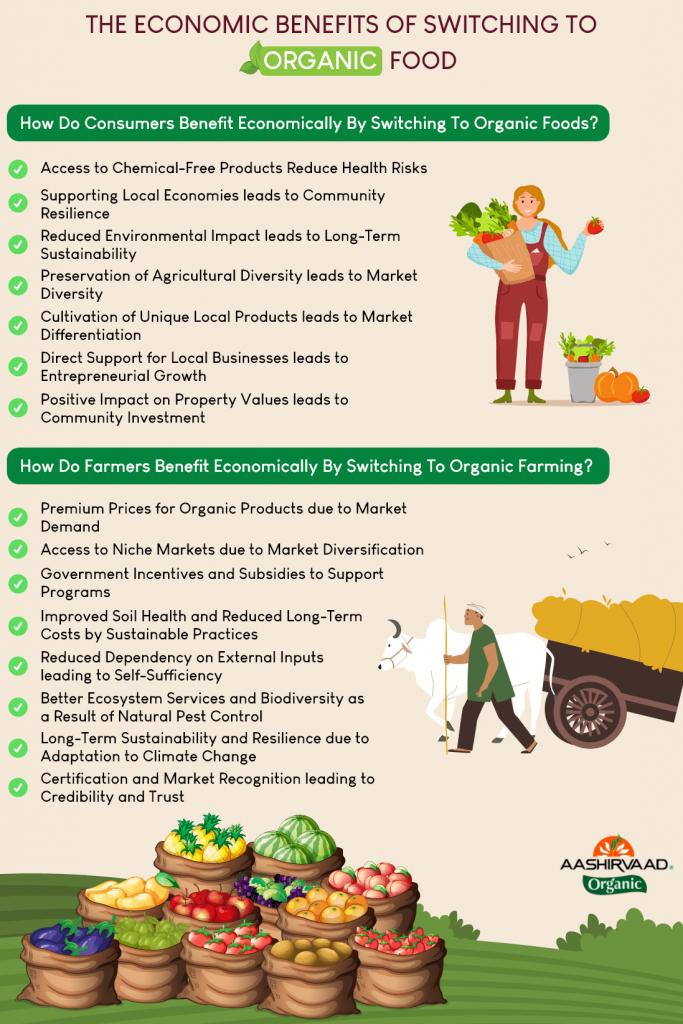
5. To Sum Up
Choosing organic products from local farms isn’t just about the immediate purchase; it’s an investment in the community’s economic well-being. In addition to directly impacting the final consumer, it encourages sustainable practices, diversifies the market, builds resilience, and provides jobs.
Further, organic farming offers farmers financial advantages such as higher pricing, fewer input costs, access to specialized markets, government support, better soil health, less of an adverse effect on the environment, self-sufficiency, increased biodiversity, long-term sustainability, and market recognition.
For everyone on the planet, organic farming is an appealing and practical option due to its financial benefits.
6. Frequently Asked Questions
a. Do government policies or incentives support the organic food industry?
The government provides incentives, subsidies, or policy support for the organic food industry to encourage growth. These measures can contribute to organic farming practices’ economic success and sustainability.
b. Are there economic benefits for farmers who produce organic foods?
Organic farmers may benefit economically from the growing market demand for organic products. The perceived health benefits and environmentally friendly practices associated with organic farming can lead to higher profit margins for farmers.
c. How does the demand for organic foods impact the economy?
The growing demand for organic foods has economic implications, driving market growth and supporting businesses in the organic food sector. This increased demand can create jobs and stimulate economic activity.
d. Do consumers really get economic value from choosing organic products?
While the initial cost of organic products might be higher, some argue that the long-term economic value lies in potential health benefits, reduced environmental impact, and supporting sustainable farming practices that contribute to overall well-being.
e. How can we tell which products are organic?
Organic food certification confirms and guarantees adherence to organic food safety standards established by the government or other independent organizations. The certification emblem informs consumers that the product satisfies best practices for organic farming standards. Consumers should be wary of marketing labels that claim to be “100% organic” and instead search for the FSSAI’s organic seal on the box’s label. The items may additionally bear additional symbols from India’s PGS and NPOP systems, depending on which certifying system granted the product certification.
 14m read time
14m read time 